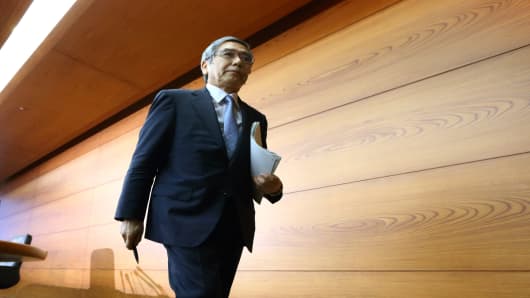The Bank of Japan's (BOJ) latest economic forecasts suggest it is likely to achieve its 2 percent inflation target later rather than sooner – a dose of realism that is good for its credibility and needed to temper market expectations, analysts said.
The BOJ shocked markets in early April by announcing that it would pump $1.4 trillion into the economy to meet a 2 percent inflation target in about two years.
But in its semi-annual economic report on Friday, the BOJ forecast core consumer inflation, the measure the central bank prefers to follow as a gauge of prices, to take slightly longer to rise to 2 percent.
It now expects consumer price inflation to hit 1.9 percent in the year starting April 2015, while the 2 percent inflation target will be achieved by the end of the following fiscal year.
"Taking a realistic view is always better than it is bad, because even if you gloss over things short-term cracks can always appear," said Mizuho Corporate Bank's market economist Vishnu Varathan.
"So it's a good thing that they're suggesting the inflation target may not be met within two years. I like how there was some uncertainty injected because that reflects the real world," he added.
Financial markets reacted to the BOJ's latest forecasts by giving the battered Japanese yen a reprieve. The yen, which has fallen more than 20 percent against the U.S. dollar since November on expectations for aggressive monetary stimulus in Japan, hit its highest level in more than a week on Monday.
(Read More: Has the Dollar-Yen Topped Out Already?)
"With BOJ officials skeptical about their own ability to boost inflation to 2 percent, it is no surprise to see dollar/yen under pressure," said Kathy Lien, managing director at BK Asset Management, in a note.
Many economists have questioned whether the BOJ, which set a 2 percent inflation target in January, would be able to achieve that goal in two years. Deflation, or falling prices, has dogged Japan for two decades and breaking out of that cycle is not going to be easy, they argue.
In fact, data on Friday showing that consumer prices in Japan fell for a fifth straight month in March highlighted just how tough the battle against deflation is.
"I don't believe Japan will get anywhere close to its 2 percent inflation target in the next two years, I think three-to-four years is a more realistic timescale," said Nizam Idris, head of strategy for fixed income and currencies at Macquarie Bank.
(Read More: Consumer Prices in Japan Fall for Fifth Straight Month)



